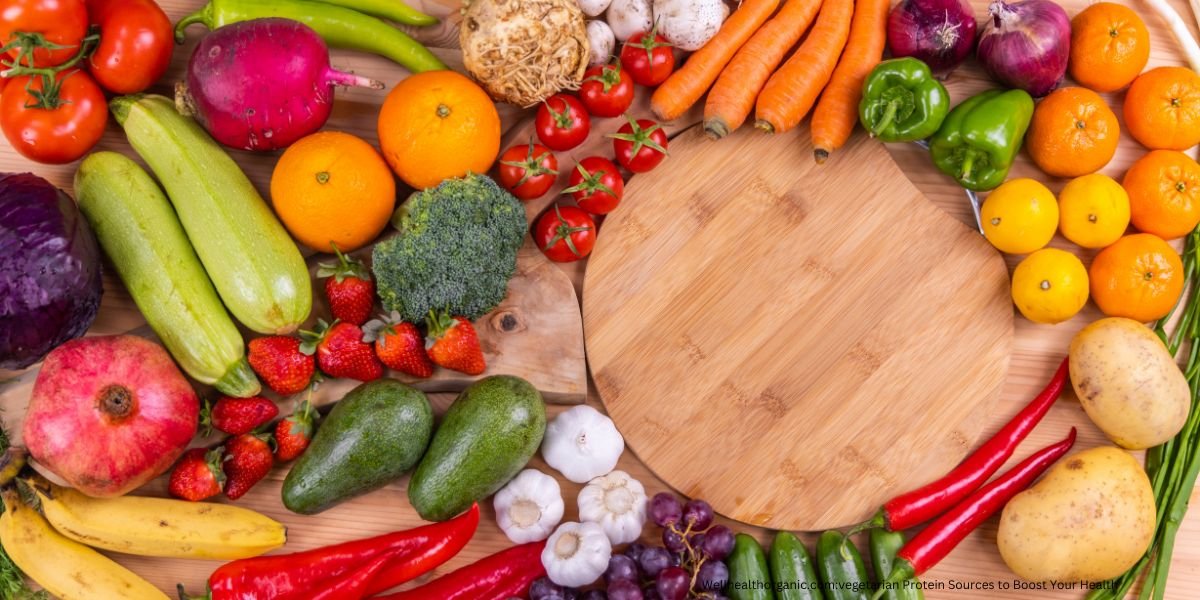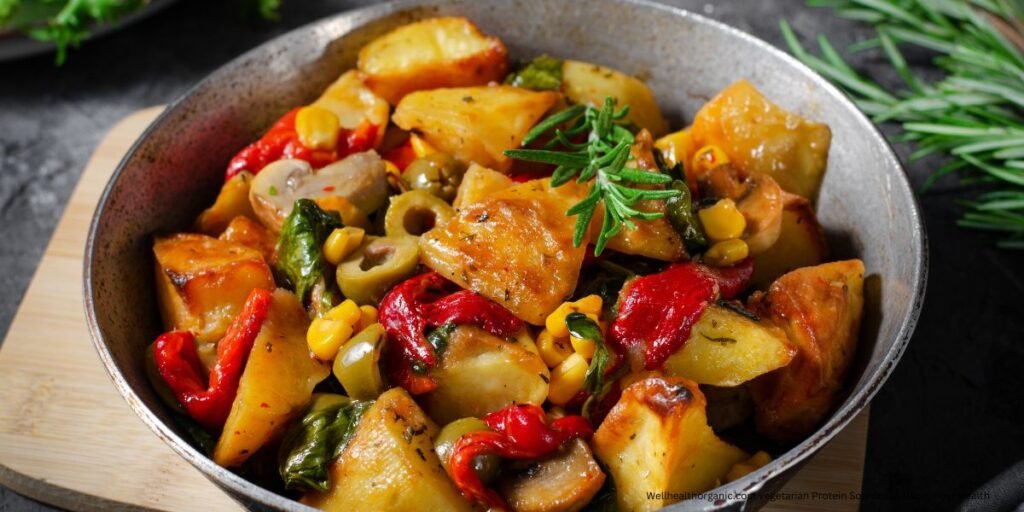
Wellhealthorganic.com:vegetarian Protein Sources to Boost Your Health
Introduction
As more people turn towards plant-based diets for health, ethical, or environmental reasons, ensuring adequate protein intake is essential. While animal products are often considered the primary source of protein, there are a variety of vegetarian protein sources that provide all the necessary nutrients to maintain a healthy and balanced diet. This article explores the best vegetarian protein options and how they can enhance your overall well-being.
Importance of Protein in the Diet
wellhealthorganic.com:vegetarian protein sources Protein is a critical macronutrient needed for the body to function properly. It plays a role in building and repairing tissues, producing enzymes and hormones, and supporting immune function. Proteins are made of amino acids, some of which the body cannot produce on its own and must be obtained through the diet.
For vegetarians, getting enough protein can be a challenge if the diet is not well-planned. However, there are numerous plant-based sources rich in protein that can fulfill your daily requirements, ensuring muscle health, energy, and overall well-being.
Overview of Vegetarian Protein Sources
Vegetarian diets offer an array of protein-rich foods that are not only nutritious but also diverse in taste and texture. From legumes to nuts and whole grains, there are plenty of options to choose from. Each source provides a unique nutritional profile, offering essential vitamins, minerals, and amino acids.
Legumes – Nutritional Powerhouses
Legumes are among the best plant-based sources of protein. This category includes beans, lentils, chickpeas, peas, and more. They are not only rich in protein but also in fiber, iron, and essential minerals.
- Lentils: A cup of cooked lentils offers around 18 grams of protein. They are also high in dietary fiber, which aids digestion and promotes satiety.
- Chickpeas: Often used in salads, curries, and hummus, chickpeas provide 14.5 grams of protein per cup.
- Black Beans: Rich in both protein (15 grams per cup) and fiber, black beans are a versatile addition to many vegetarian dishes.
Nuts and Seeds – Compact Nutrient Sources

Nuts and seeds are excellent sources of both protein and healthy fats. They are energy-dense, making them a great option for snacking or adding to meals.
- Almonds: Contain around 6 grams of protein per ounce. They are also high in vitamin E, magnesium, and heart-healthy fats.
- Chia Seeds: Despite their tiny size, chia seeds pack a protein punch, offering about 4 grams per two tablespoons. They are also rich in omega-3 fatty acids and fiber.
- Pumpkin Seeds: A popular choice for salads and snacks, pumpkin seeds provide around 9 grams of protein per ounce.
Quinoa – The Complete Protein Grain
Quinoa is often referred to as a “superfood” because it contains all nine essential amino acids, making it a complete protein source. Unlike many grains, quinoa provides a balanced amino acid profile similar to that of animal proteins.
- Protein Content: A cup of cooked quinoa offers around 8 grams of protein.
- Nutritional Benefits: Quinoa is also rich in fiber, magnesium, and antioxidants, which help combat inflammation and support overall health.
Soy Products – Tofu and Tempeh
Soy-based products, such as tofu and tempeh, are staples in many vegetarian diets. These foods are not only rich in protein but also offer a complete amino acid profile. wellhealthorganic.com:vegetarian protein sources.
- Tofu: A half-cup serving of tofu contains around 10 grams of protein. It’s highly versatile and absorbs the flavors of the dishes it’s cooked with.
- Tempeh: Fermented soybeans pressed into a block, tempeh offers an impressive 15-20 grams of protein per serving. The fermentation process also makes it easier to digest and increases its nutrient content.
Dairy Products for Lacto-Vegetarians
For those following a lacto-vegetarian diet, dairy products are excellent sources of protein and essential nutrients like calcium and vitamin D.
- Greek Yogurt: A single serving of Greek yogurt contains 10-15 grams of protein, making it a perfect addition to smoothies, breakfast bowls, or snacks.
- Cottage Cheese: With around 14 grams of protein per half-cup, cottage cheese is a low-fat, high-protein dairy option.
Innovative Plant-Based Options
In recent years, innovative plant-based products have gained popularity for their high protein content and meat-like texture.
- Plant-Based Meats: Products like Beyond Meat and Impossible Burgers offer around 20 grams of protein per serving, mimicking the texture and flavor of traditional meats while being entirely plant-based.
- Seitan: Made from wheat gluten, seitan is a high-protein meat substitute with about 21 grams of protein per 3-ounce serving. It has a texture similar to meat and is a favorite among vegetarians and vegans.
Health and Environmental Benefits of Vegetarian Proteins

Consuming vegetarian protein sources provides numerous health benefits, including lower risks of chronic diseases such as heart disease, type 2 diabetes, and certain cancers. Plant-based proteins are also easier to digest and come with fewer saturated fats compared to animal proteins.
In addition to personal health, vegetarian proteins have a lower environmental impact. Growing plant-based foods requires less land, water, and energy compared to raising livestock, making it a more sustainable choice for the planet.
Tips for Incorporating Vegetarian Proteins into Your Diet
- Mix and Match: Combine different protein sources such as legumes, grains, and nuts to create balanced meals.
- Snack Smart: Opt for protein-rich snacks like roasted chickpeas, nuts, or Greek yogurt.
- Experiment with Recipes: Try new recipes that incorporate plant-based proteins, such as quinoa salads, tofu stir-fries, or tempeh burgers.
- Use Supplements if Needed: If you’re struggling to meet your protein needs, consider adding plant-based protein powders to smoothies or shakes.
FAQs
What are the best vegetarian protein sources?
The best vegetarian protein sources include legumes, nuts, seeds, quinoa, soy products, and dairy for lacto-vegetarians.
Can vegetarians get enough protein without supplements?
Yes, vegetarians can meet their protein needs by consuming a variety of plant-based foods such as beans, lentils, nuts, and whole grains.
Is quinoa a complete protein?
Yes, quinoa is considered a complete protein because it contains all nine essential amino acids.
What are some high-protein snacks for vegetarians?
High-protein snacks for vegetarians include Greek yogurt, nuts, seeds, roasted chickpeas, and protein bars.
Are plant-based proteins better for the environment?
Yes, plant-based proteins generally have a lower environmental impact compared to animal-based proteins, requiring less water, land, and energy to produce.